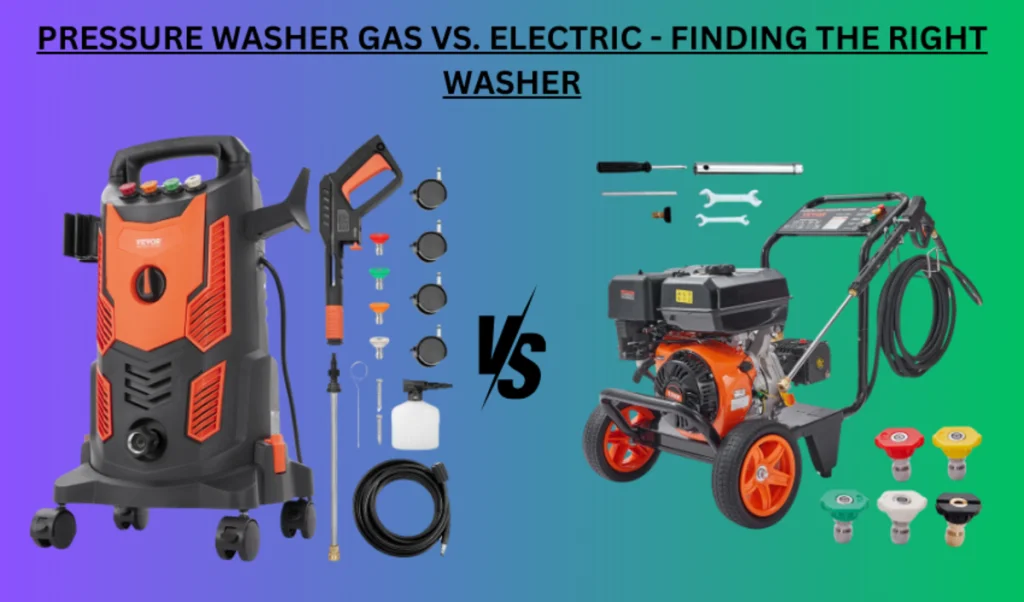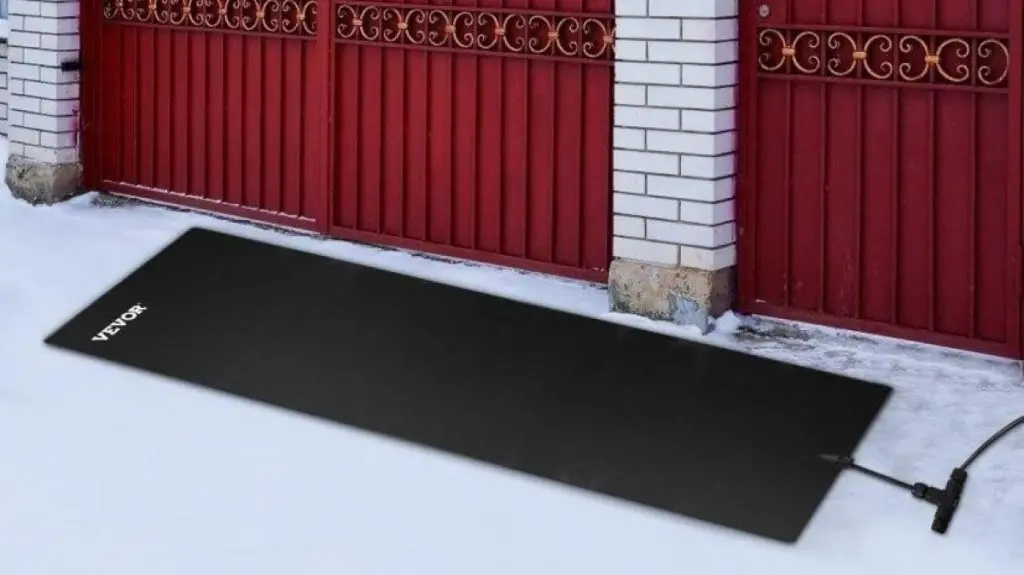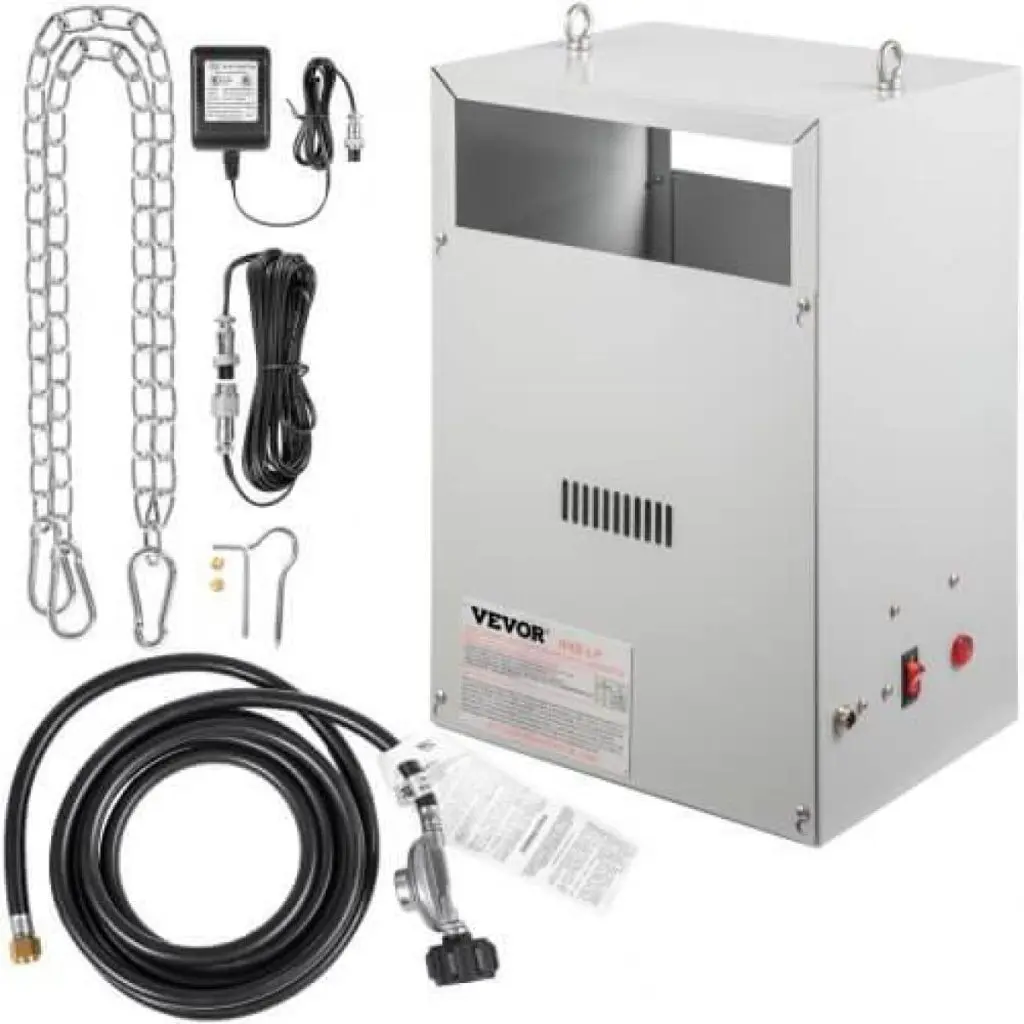Introduction
Is it not easy for you to choose between a Pressure washer gas and electric? The process of selection can even turn out to be the most difficult part of the whole process, with diverse options to choose from. Gas and electric pressure cleaners have both advantages and disadvantages. Gas-powered machines are more powerful and mobile, but they are also loud and need more maintenance. On the one side, the pressure washer features easier, quieter, and offers less maintenance. But, on the other, they may not be powerful enough to handle hard tasks. Let’s delve into this comparative analysis so that you can decide which one to select.
Table of contents
Brief Overview Of Gas Pressure Washer
The gas pressure washer makes use of gas to power the washer. Pressure washers are often implemented in exterior operations, for example, the cleaning of driveways, decks and siding.
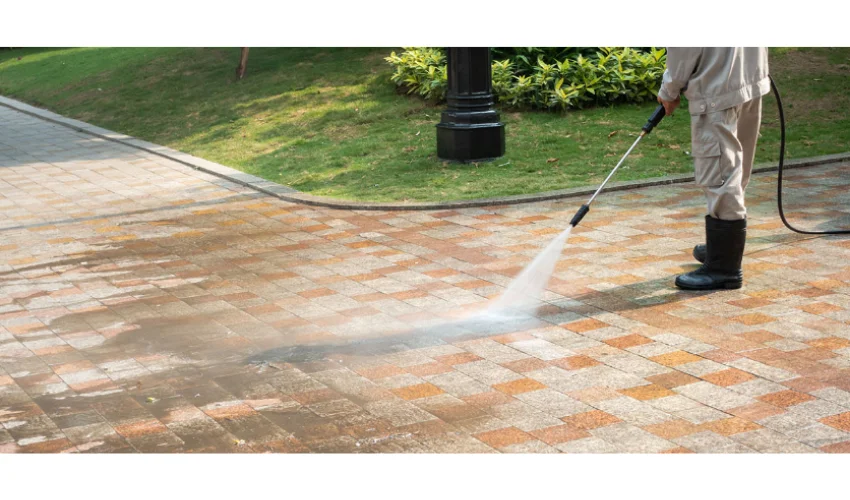
The motor activates the pump that moves the water out from the hose and builds the pressure. Pressurized water is emitted through the wand at a pace to ensure that all the dirt, grime and other trash are removed from the surfaces.
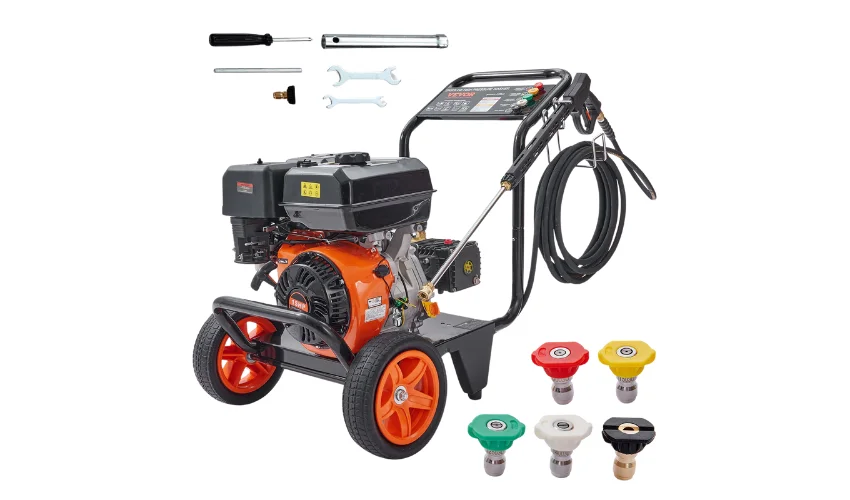
To make up a gas pressure washer are the engine, the pump, the water inlet, the hose, the wand and the nozzle. The engine provides power, and the pump generates the water pressure. The inlet is attached to a garden pipe that supplies water for the system by the machine. The pipe transfers the pressurized water from the pump to the point where it exits through the high-speed nozzle.
Brief Overview On Electric Pressure Washer
Electric pressure washers are characterized by their flexibility in using electrical motors to create high-energy streams and for cleaning different surfaces.
An electric pressure washer begins the operation by switching on the internal motor that uses electricity to draw out water from a connected water source, which could be a hose or tap. This water comes out at a higher speed.
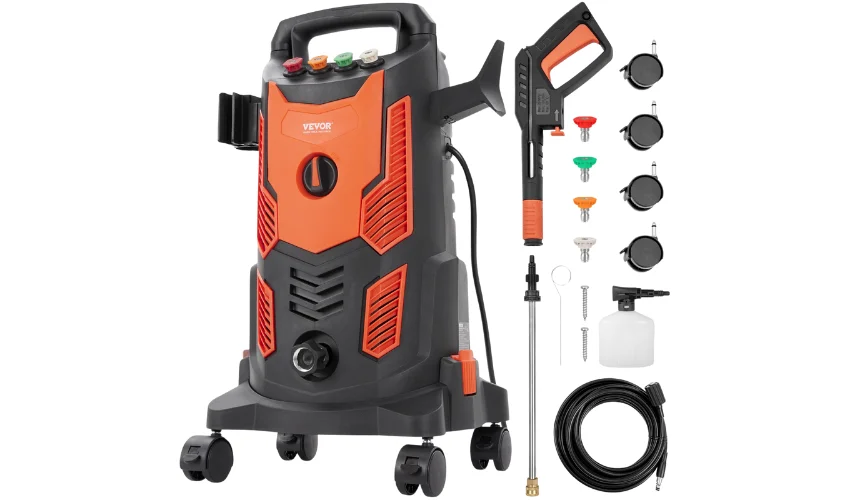
The main components of the electric pressure washer include nozzle, hose, motor, wand, pump, and tank. The motor offers higher pressure, and the pump sucks the water. Nozzle supply the water.
Notable Key Differences – Pressure Washer Gas Vs Electric
When choosing between electric pressure washer vs. gas. There are some main things which you need to compare, such as.
| Sr. No. | Feature | Electric Pressure Washer | Gas Pressure Washer |
| 1 | Cost: | Lower upfront cost | Higher upfront cost |
| 2 | Maintenance: | Less maintenance (lubrication, filter cleaning) | More maintenance (oil changes, spark plugs, filters) |
| 3 | Power: | Lower PSI (typically up to 1,800 PSI) | Higher PSI (typically 2,000 PSI and above) |
| 4 | Mobility: | Limited by cord length | More mobile can operate anywhere with fuel |
| 5 | Longevity: | Shorter lifespan (5-7 years) | Longer lifespan (8-10 years) |
| 6 | Noise: | Quieter (around 80 dB) | Louder (around 100 dB or more) |
| 7 | Environmental impact: | No emissions | Produces gas emissions |
| 8 | Ease of use: | Easier to start and operate | Requires more user knowledge and effort |
| 9 | Weight: | Lighter and easier to maneuver | Heavier and bulkier |
Support for Mobility:
The gas-powered pressure washers do not restrict you to power cables that you can use freely to wander around without having to be connected to an outlet. They are suitable for cleaning large outdoor areas with limited access to electricity.
Some electric pressure washers come with power cords that limit your mobility and the accessibility you have to certain areas. Nevertheless, they are lighter in weight and more compact to give them an advantage with maneuvering and transportation.
Output Power:
Gas-powered pressure washers provide more power than electric ones. They are suitable for heavy tasks such as driveways, decks, and sidewalk clean-up. Elevated water pressures and flow rates create a powerful cleaning effect that is quick and efficient.
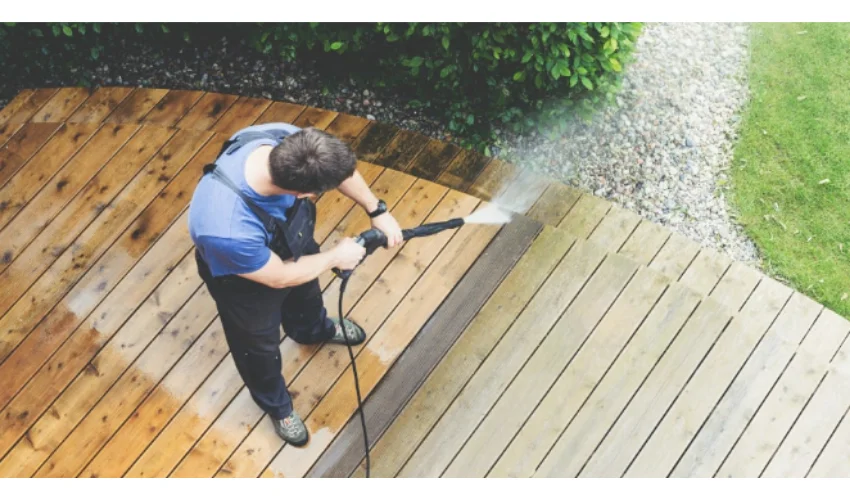
Respectively, electric pressure washers are less powerful than their gas counterparts, but still have sufficient power for nearly any household cleaning job. They can be used for carwashing, cleaning patio furniture, and similar smaller areas outside. Gas pressure washers may have more power, but generally, electric models are sufficient for reaching the required performance.
Measures for Maintenance:
Regular maintenance of gas pressure washers like oil change, spark plug replacement, and fuel system cleaning is a must. The improper course of maintaining the gas pressure washer can be the source of performance problems and expensive repairs.
An electric pressure washer has fewer moving parts than a gas version, but it is also simpler to maintain. Just cleaning the unit now and then and inspecting it for any type of defects should be enough to do the job.
Associated Cost:
The price of gas pressure washers is higher than electric ones mainly because of their higher power output and bigger size. Furthermore, you should also plan for spending on fuel and service.
Compared to gas pressure washers, electric models are normally cheaper. Therefore, they are more affordable for homeowners. Moreover, they are less labor intensive, hence reducing running costs.
Impact on Environment:
Gas pressure washers discharge vapors and contribute to the air pollution level. In addition, they utilize fossil fuels, which are finite sources.
In contrast, this is not the case with the electric pressure washer. Since the bad impact on the environment by these washers is negligible.
Noise Level:
The combustion engine in the gas pressure washers accounts for more noise than the electric models. The noise level can be distracting, particularly in residential zones and calm neighborhoods.
Electric pressure washers are preferable to gas-powered models in noise-sensitive environments. You can clean outdoor spaces without disturbing your neighbors or members of your household.
Life Expectation:
Gas washers are typically better constructed and last longer than electric ones. Also, life depends on the care and maintenance measures you follow. Considering the value for money, the electric pressure washer is a good deal.
Notable Considerations Before Selecting Electric Pressure Washer Vs Gas
Usage Type:
Recall how frequently the electric pressure washer vs. gas is used. If you clean more often, then choose the gas-pressure washer. If the usage is lower, then go for an electric pressure washer. If you clean tough stains, then a gas-pressure washer offers high pressure. At the same time, electric pressure washers offer low pressure suitable for mild stains.
Cleaning Activities:
Consider various cleaning activities that you will need to perform. The Electric pressure washers feature suitability for lighter jobs like car washing and deck and outdoor furniture cleaning. In contrast, the higher power output in gas-pressure washers is suitable for tasks like cleaning sidewalks, driveways, and large outdoor spaces.
Noise Level:
If silence is what you’re after, the electric washers are the ideal solution since the gas ones tend to be more noisy. Compression fuel washers are louder as they make use of combustible engines that may be disturbing to the residents of residential areas.
Power Accessibility:
Assess if there is a power source in the area or not. Electric pressure washers need access to electricity. Hence, they feature low mobility. At the same time, the gas pressure washers received power from gas. Thus, they can be used anywhere outdoors.
Your Budget:
Consider your budget when going to purchase the pressure washers. Gas pressure washers are more expensive to buy than electric ones. Moreover, they need refueling and maintenance. Therefore, they eventually cost you money.
Environmental Considerations:
The environment should be in your mind if you are choosing between an electric and gas pressure washer. The electric washers are usually environmentally friendly, and they do not release emissions. In comparison, the exhaust fumes of gas pressure washers get released into the air and result in air pollution.
Requirement for Storage Space:
Consider where you are going to put the pressure washer. Electric ones are compact and are more lightweight than diesel ones. This can be kept in places like garages and sheds with limited space. The gas pressure washers have higher weight and require more storage space than an electric unit.
VEVOR Gas Pressure Washer Vs Electric Products
1. Gas Pressure Washer
Experience the amazing cleaning effects by using a VEVOR Gas Pressure Washer.
3600 PSI High-pressure:
Experience the mighty power of 3600 PSI pressure and 2.6 GPM flow rate. Ideally, for those stubborn stains on brick patios and driveways stained by oil. A gas pressure washer is a must-have tool when you do not have access to power outlets.
Efficient 7 HP Engine:
With a 210 ml 4-spoke power engine and 0.8-gallon gasoline capacity, this gas pressure washer is known for its easy start-up and copper pump. Suitable for do-it-yourselfers who value strength and performance.
Multipurpose Use:
Comes with 5 quick-connect metal spray nozzles, which can go from strong to light water jets. Because it is suitable for the different cleaning tasks and it saves the unnecessary expenditure.
Well-stored Accessories:
Comprise a spray gun, 5 nozzles, and a 26 ft abrasion-resistant water hose. It is conveniently stored on the machine to prevent any part misplacement.
Move with Ease:
It has a strong steel frame, an ergonomic handle, and two 10-inch carts that will never go flat. Easily take it from the front yard to the back yard, thus saving you time and allowing you to move around with less tiredness.
You can also read more about the heavy duty gas pressure washer here.
| Sr. No. | Parameter | Specs | Parameter | Specs |
| 1 | Item Model Number | BS180D-SP | Max. Pressure | 3600 PSI |
| 2 | Max. Flow Rate | 2.6 GPM | Power | 7HP |
| 3 | Engine Type | 210cc | Gas Tank | 0.8 gal / 3L |
| 4 | Nozzles | 0°/15°/25°/40″ | Hose Length | 26 ft / 8 m |
| 5 | Hose Dia. | 0.5″ / 12.55 mm | Wand Length | 2.6 ft / 81 cm |
| 6 | Wheels Size | 10″ / 25.4 cm | Weight | 58.2 lbs / 26.4 kg |
2. Electric Pressure Washer
Feel strong and effective cleaning power with the VEVOR Electric Pressure Washer. Featuring a maximum pressure of 2300 PSI, a flow rate of 1.9 GPM, and 1900W power, this device will demonstrate great performance for numerous cleaning responsibilities.
2300PSI High-pressure Washer:
Powerful 1900W motor produces a high water flow rate of up to 1.9 GPM for thorough cleaning. Ideal for scraping off paint, oil, weed, and tough stains from various types of surfaces such as houses, RVs, patios, fences, decks, driveways, automobiles and lawn equipment. The automatic shutdown feature is a security element that stops operation in case temperatures are higher than 266°F.
Extended Hose & Leak-proof:
Clean even large areas easily with the 26ft hose, while the strong metal water inlet and outlet keep water leakages away. Because of its IPX5 waterproof rating, you can count on the washer to complete the job with no concern about water droplets all over the place.
Easy Moving
It is so easy to move around with the PP plastic mold, ergonomic handle, and 4 inherent wheels. The assembly is easy and fast, and in fact, one person can complete it in minutes without exerting strain and fatigue during house cleaning.
Different Nozzles
From 4 quick-connect metal spray nozzles (0°/15°/25°/40°) and a 500ml self-spraying detergent bottle, you can clean up various tasks easily. In-flow filtering guarantees you a smooth working nozzle without blockages that will save you time and costs associated with changing a nozzle.
For best RV pressure washer selection read more here.
| Sr. No. | Parameter | Specs | Parameter | Specs |
| 1 | Model | HWT23P | Voltage | 120 V/ 60 Hz |
| 2 | Wattage | 1900 W | Max. Pressure | 2300 PSI |
| 3 | Max. Flow Rate | 1.9 GPM | Nozzles | 0/15/25/40 Degree |
| 4 | Water Temperature | 32-104 °F / 0-40 °C | Pressure Hose Length | 26 ft / 8 m |
| 5 | Power Cord Length | 35 ft / 10.6 m | Protection | IPX5, GFCI |
| 6 | Item Weight | 21.6 lbs / 9.8 kg | Item Dimensions | 12.4′ x 10.4″x 35″/315 x 265 x890 mr |
FAQs
Do electric pressure washers need oil?
Indeed, electric pressure cleaners do not require oil to operate. On the contrary, gas pressure washers with engines that use oil to lubricate moving parts do not contaminate the water like electric models that only use electricity.
Is an electric pressure washer able to clean concrete?
Electric pressure washers can efficiently clean the concrete provided the right nozzle is selected, and enough pressure is employed. This rapid pressure stream of water is able to take away dirt, filth, and even stains from the concrete surfaces giving new shine to them again.
Which one is best for you, a gas or electric pressure washer?
The superior gas pressure washers supply more power and versatility, which is really great for heavy cleaning operations in the open air. On the contrary, electric pressure washers are not as noisy as gas-powered ones, require very little maintenance and are environment friendly.
How much is the life expectancy for the Electric as well as gas pressure washer?
Gas pressure washer has a life of about 10 to 15 years. On the other hand, electric pressure washers last around 7 years.
When to not use a pressure washer?
Avoid using a pressure washer on soft surfaces, as it may cause damage.
Conclusion
In a nutshell, when you are choosing between a pressure washer gas and electric, it is wise that you consider your own needs and preferences. Electric pressure washers are quiet, lower in maintenance, and environmentally friendly, which makes them an awesome choice for lighter tasks and indoor use. Those pressure washers that run on gas are more powerful and mobile. These washers really suit applications that require heavy-duty outdoor cleaning jobs. An option exists to choose either electric or gas models. VEVOR offers a variety of quality products to ensure you get exactly what you need. So, why wait? Take action now and purchase VEVOR’s right pressure washer to solve your cleaning problems.

